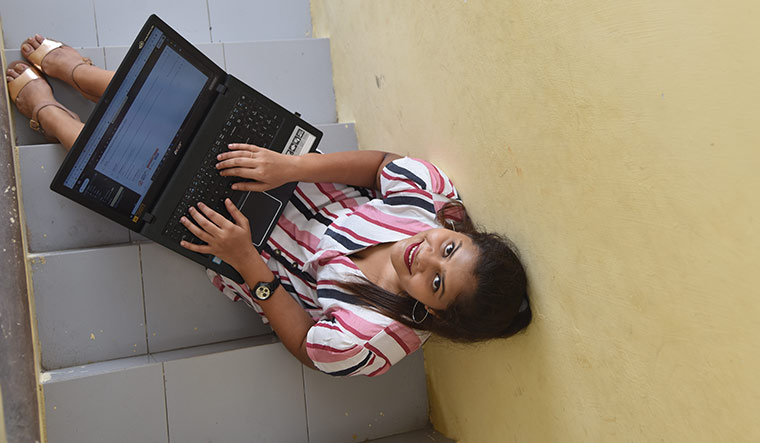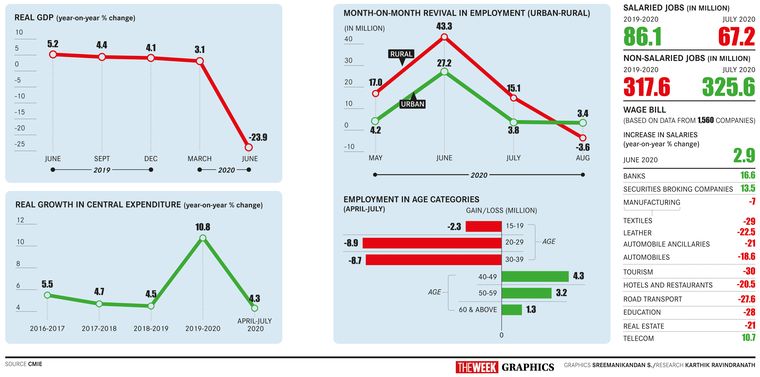Hashicorp CEO Mitchell Hashimoto recently asked his employees whether they knew the difference between typing ok, ok. or ok.. Not knowing the difference in today’s world, he said, is equivalent to being illiterate. According to him, ok. has a negative implication while ok.. reflects uncertainty. Chat literacy, like many other things, is probably a side effect of the pandemic. It is just one of the ways in which Covid-19 has turned the world topsy-turvy.
As a result, we have all gotten “cyber-struck”. Zoom rooms, remote fitness and online concerts have become the norm. Education got interactive with video games teaching you the basics of trigonometry. Apps like Krisp and Muzzle streamlined video conferencing without screen pop-ups and background noise. Companies like Twitter and Shopify made remote working more or less permanent. Gaming platforms like JetSynthesys raised crores in funding.
In a way, the virus has proved to be the tipping point of digitalisation. “We have seen two years’ worth of digital transformation in two months,” said Microsoft CEO Satya Nadella in May. “If you embrace digital, then no matter what job you do, it will be a hot job,” says Ashutosh Khanna, senior client partner, Global Consumer Markets, Korn Ferry International. “Take marketing. If you don’t know how to run a digital campaign or organise your company’s data, then you might know how to make the world’s best television commercial, but you are not relevant anymore.” According to Rohit Kale, who heads the India operations of Spencer Stuart, the role of a chief digital officer is becoming redundant because digital has infiltrated every aspect of work.
The Centre for Monitoring Indian Economy estimates that 27 million youth in India lost their jobs in a single month (April). Hiring did pick up 35 percentage points from April to June, as per a recent LinkedIn report. However, the market recovery is expected to remain “fairly flat”. Competition for jobs had doubled over six months, with an average of 90 job seekers on the platform in January increasing to 180 in June. Those in sectors like recreation and travel were 6.8 times more likely to look for jobs in a different sector. The most popular jobs were those of a software engineer, business development manager, sales manager, business analyst and content writer, with the top skills being JavaScript, Structured Query Language, sales management, team leadership and recruiting.
Khanna says that in future, everyone is going to have multiple careers. “If you are a journalist, you might not remain a journalist all your life,” he says. “You are [essentially] a content person. If you don’t have that perspective, you might have a career problem down the line. Increasingly, it is about knowing which skill-sets you want to acquire. If you are not investing in yourself, [you will become redundant]. Why is nobody spending money to re-skill themselves? Show me a post-graduate who came out of college in the 1990s and who, in the last seven or eight years, has expressed an interest in learning how to write code. If you don’t know how to code, you will become a fossil in five years.”
Hiring patterns, too, have changed. Artificial intelligence and machine learning have revolutionised the hiring process and increased the competition for jobs. “With data-driven algorithms, multiple rigorous parameters can be set to learn extensively about a wider pool of candidates and proactively reach out to them early,” says Vikram Ahuja, co-founder, Talent 500 by ANSR. NLP-powered chat bots are enabling recruiters to set up interactive sessions with multiple candidates and thus aiding ‘contact-less hiring’.
Post pandemic, instead of hiring new talent, many companies are hiring specialists as advisers or on a project basis, says Jyoti Bowen Nath, managing partner, Claricent Partners. Also, Covid-19 has raised the issue of ethical treatment of employees and gig workers (those hired temporarily). According to one survey, 70 per cent of gig workers were not satisfied with the support they received from their employers during the pandemic.
In the education sector, the shift towards online learning has been stark. “Whether it is the primary mode of delivery or not, it will undoubtedly complement the traditional learning method,” says Ambrish Sinha, CEO, MeritTrac Services. “However, there will be teething issues like getting teachers and students accustomed to a new interface and mode of learning and access to internet and devices. Investments will need to be made in suitable IT-enabled infrastructure and full stack digital solutions. Teachers will need not just hands-on training on the various technologies and tools available to impart knowledge effectively, but also classroom management strategies and identifying how they can best work with different types of learners remotely, keeping their cognitive development and learning styles in mind.”
Another factor that is being widely discussed, especially as tech jobs take centre-stage, is the importance of man-machine collaboration. “The health crisis gave people a greater appreciation for the fact that humans and technology are more powerful together than either can be on their own,” states a Deloitte report. “Consider how telemedicine, manufacturing, education and even grocery delivery drew on the power of integrated human-machine teams during the crisis.”
Professor Amit Karna, Chair –Placement, IIM Ahmedabad, says that what recruiters are looking for today are candidates with learning agility. “If there were two candidates, one with greater intelligence and the other who can adapt more, the second would probably get picked,” he says. In this uncertain scenario, students too are anxious about their future. “We are a little sceptical about the start-up space which, we feel, will take three to four years to recover,” says Akanksha Priya, a second-year student at IIM Ahmedabad. “As a batch, we prefer stable companies who will not revoke offers. Product management roles are in high demand, since tech has not been impacted much by the pandemic. Even those without a background in technology are taking courses to gain some experience. We are also optimistic about consulting. Registration for various competitions [on campus] has increased because students are hoping to get Pre-Placement Offers (PPO) from companies if they win these competitions. Even if they don’t want the job, they want a backup for more bargaining power. Everyone is focusing on building up their Cvs.”
According to Manish Bahl, assistant vice president, Centre for the Future of Work—Asia Pacific, Cognizant, the pandemic will create a whole new category of jobs. “Covid-19 has disrupted every aspect of our work, life and society,” he says. “We still don’t know how this will end, but we do know that the world that emerges post-virus will look and feel incredibly different. The virus forced a reckoning of how we view, perform and reward work. The next five years will bring more change in employment trends than the previous 20.”
Some of the jobs he mentions are: Chief Cleanliness Officer (CCO): Covid-19 has changed how people see the world. With this new perspective, they suddenly realise that everything around them is unclean and potentially unsafe. The CCO will lead the global clean regime movement by leveraging AI technologies to monitor the cleanliness of physical assets and initiate automated cleanliness actions as needed.
CEO—Cashless Society: Consumers are increasingly avoiding touching and using cash. The CEO will use AI tools to analyse and evaluate cashless data, prepare forecast reports, and take the necessary steps in moving us towards a cashless society.
Financial Wellness Coach: People are already struggling to manage their finances and agonising over how to best plan for a post-Covid world. The financial wellness coach will use AI platforms to ensure the financial well-being of customers by translating their personal needs and life goals into financial targets.
Give-to-Get Trust Manager: Give-to-Get is all about the data customers give about themselves—personal, financial and transactional—and what they receive in return from a company (better service and rewards). The role of a trust manager will be to develop and manage the positive give-to-get trust framework for customers to meet their expectations from brands.
WFH Facilitator: The work-from-home (WFH) facilitator will oversee the integration and engagement of the remote workforce. The facilitator will be responsible for ensuring that we have the right technologies, HR processes and culture to make ubiquitous remote work a soaring success.
To some, these jobs might seem futuristic, but they are coming. In the meanwhile, based on our interaction with various business heads, industry experts and recruiters, THE WEEK lists 10 jobs that, in the post-pandemic scenario, have become highly desirable.
The logistics sector, for example, has seen an increase in job creation due to the boom in e-commerce, says Sumit Kumar, vice president, NETAP, TeamLease. According to him, there is also an increased demand for health care professionals and, in the pharma and biotechnology sector, for more scientists for research and development.
In the education sector, the online learning boom has created a need for content developers, content writers and virtual trainers. The increase in digital payment transactions has led to more field sales professionals being hired for merchandiser enrolments. Greater adoption of technology and digitalisation means a greater demand for cyber-security specialists, data analysts, data scientists and AI and machine learning experts. “AI scientists who can build systems for data anonymisation will be in demand especially in a post-Covid-19 world,” says Ranga Jagannath, director–growth, Agora. “Analysing real-time human engagement to decode human emotions and engagement patterns will increase personalisation of products and services.”
If you are in these jobs, Covid-19 might just have made your prospects brighter. If not, you might be hoping that things will go back to the way they were. They probably will not. Some changes are going to be permanently etched into the fabric of our society. During World War II, many people thought that wartime surveillance and encrypted communication would last only until the end of the war. They were wrong. And if you do not want to hear those two brutal words immortalised by President Donald Trump in The Apprentice, it is time you figure out ways to stay relevant in the curious world that is being birthed by a pandemic.





